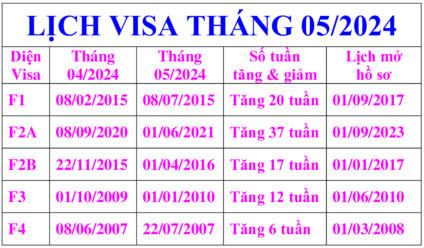Hồ sơ xuất cảnh định cư ở Mỹ diện F. Nếu người cha đứng tên bảo lãnh bị qua đời thì người mẹ có được tiếp tục thay cha đứng tên bảo lãnh hay không? Và hồ sơ có được giữ nguyên ngày ưu tiên?
- Theo luật di trú Hoa Kỳ không có luật chuyển tên từ người bảo lãnh này sang ngươì bảo lãnh khác vì bất cứ lý do gì mà vẫn giữ được ngày ưu tiên của I-130.- Khi người bảo lãnh qua đơì hồ sơ sẽ bị đóng và trả về USCIS.
- Người được bảo lãnh có thể xin phục hồi đơn bảo lãnh, tuy nhiên thư xin phục hồi có được chấp thuận hay không còn tuỳ thuộc vào từng hồ sơ.
- Thư xin phục hồi đơn bảo lãnh sẽ được nộp tại USCIS, theo địa chỉ nộp I-130
Phục hồi đơn bảo lãnh
Hiện nay chỉ có 2 trường hợp mà đơn bảo lãnh được cứu xét khi ngươì bảo lãnh qua đời.
1. Người bảo lãnh qua đời sau khi I-130 đã được chấp thuận
Luật này nói rằng nếu người bảo lãnh qua đời sau khi đơn bảo lãnh được chấp thuận, các đương đơn sẽ được cứu xét di trú nếu có một thành viên gia đình ở Hoa Kỳ có thể cung cấp các chứng minh về việc bảo trợ tài chánh. Và phải có những yếu tố rất nhân đạo. Không có những yếu tố nhân đạo, sở di trú nhiều phần sẽ không chấp thuận.Lý do nhân đạo
Một vài thí dụ về những lý do rất nhân đạo là người được bảo lãnh là thành viên gia đình sau cùng còn ở lại Việt Nam, hoặc đương đơn đang có những vấn đề sức khỏe và mong muốn được điều trị ở Mỹ với sự giúp đỡ của gia đình, hoặc đương đơn đang gặp rất nhiều khó khăn kinh tế không thể giải quyết được ở Việt Nam.Bằng chứng liên hệ
Thêm vào đó, cũng phải có những chứng minh liên hệ giữa người bảo lãnh và người được bảo lãnh kể từ ngày nộp đơn bảo lãnh, các bằng chứng liên hệ đến Hoa Kỳ, liên hệ với những thành viên gia đình khác ở Mỹ, và những bằng chứng cho thấy các thành viên gia đình của người bảo lãnh ở Mỹ sẵng sàng và có thể giúp đỡ người được bảo lãnh cho đến khi họ có thể tự túc sinh sống.Người được bảo lãnh có thể xin cứ xét nhân đạo bằng cách gởi thư đến USCIS để XIN PHỤC HỒI ĐƠN I-130 KHI NGƯỜI BẢO LÃNH QUA ĐỜI
2. Người bảo lãnh qua đời trước khi I-130 được chấp thuận
Ngày 29/10/2009 đã có luật mới để bổ sung cho luật cũ, sẽ hết hạn vào ngày 28/10/2011, trong đó sự thay đổi luật di trú cho phép sự chấp thuận đơn bão lãnh hoặc đơn chuyển diện xin thẻ xanh, nhưng phải có những điều kiện bắt buộc như sau:. Người được bảo lãnh phải hiện đang sinh sống tại Hoa Kỳ khi người bảo lãnh qua đời. Và
. Đương đơn tiếp tục cư ngụ ở Hoa Kỳ cho đến ngày có quyết định về đơn bảo lãnh hoặc đơn xin chuyển diện.
Rõ ràng là luật thay đổi này sẽ không mang ích lợi nào hết cho những người thân đang sinh sống ở Việt Nam khi người bảo lãnh qua đời. Trong trường hợp này, thân nhân ở Việt Nam phải chuyển sang Ðạo Luật Bảo Lãnh Gia Ðình (1).
. Ngoài ra, luật thay đổi này cho phép vợ goá/chồng goá/con của công dân Mỹ có thể tự nộp đơn I-360, Petition for Amerasian, Widow(er), or Special Immigrant, để xin visa khi vợ/chồng/cha của họ là công dân Mỹ đã qua đơì.
Obama signs law cancelling automatic revocation of petitions upon petitioner’s death
IMMIGRATION SOLUTIONS
By ROBERT L. REEVES
October 31, 2009, 12:54pm
On October 29, President Obama passed into law Congress’ landmark immigration bill that ends the automatic revocation of a visa petition when the petitioner dies. This will provide significant relief to immigrants and their families who have waited for their priority dates to become current only to have the petition revoked upon the death of the petitioner. The new law helps many surviving family members residing in the United States.The demand for immigrant visa numbers for family-based and employment-based sponsorship far exceeds the supply. This has resulted in massive backlogs with immigrants waiting years and even decades for their priority date (their place in line) to become available. Many petitions simply do not survive the protracted waiting period. The death of a petitioner or principal beneficiary results in an automatic revocation of the immigrant visa petition. Surviving family members were left with no means to obtain immigrant status based on that petition. In limited circumstances, the Immigration Service will reinstate a family-based petition for humanitarian purposes. Humanitarian reinstatement was discussed in one of our previous articles.
Specifically, under this new law, six groups of surviving family members, who were in the US when the petitioner or principal beneficiary died, and continue to reside in the US, may adjust status to permanent residents when their priority date is reached. The first group allows the spouse of a US citizen or the unmarried child of a US citizen under the age of 21 to continue processing even if the US citizen petitioner dies while the immigrant visa petition is either in process with the immigration service or has been approved. Before this law, if the US citizen died before the petition was approved or permanent resident status was granted, the spouse or child would be unable to obtain permanent resident status.
The second group covers the family preference categories who have approved or pending petitions. These include the spouse and unmarried children of permanent residents, the unmarried children over the age of 21 of US citizens, married children of US citizens, the brothers and sisters of US citizens, and the derivative children of this group. If a US citizen petitioned his sister in the Philippines, it would take approximately 22 years for a visa number to become available. If the US citizen died 15 years after filing, and before the visa number become available, his sister, her husband and their children would no longer be able to immigrate to the US. The new law, however, allows her and her family to immigrate to the US as long as they were residing in the US when the US citizen died and continued to reside in the US when their visa number became available.
The third group covers the derivative beneficiaries of pending or approved employment-based immigrant visa petitions. These are the spouse and unmarried children under 21 of someone sponsored under an employment-based category. For example, an immigrant was petitioned by her employer as an accountant. She and her family are residing in the US. Her immigrant visa petition is either approved or in process and she and her family are waiting for her priority date to be reached. Before her priority date is reached, or the USCIS can approve an application for adjustment of status, the accountant unfortunately dies. Prior to the new law, her family would not be able to continue the immigrant process. This scenario is unfortunately all too common. To add insult to the injury of losing a loved one, under the prior immigration law, the family would have no means of continuing the immigrant process. They would be required to burry a loved one and uproot their lives from the US. Under the new law, the family may continue processing for permanent resident status even if the principal beneficiary passes away. This law provides much comfort to those who have brought their families to the US and are dependent on the employment immigrant visa to provide immigrant status for the family. If they pass, their families will continue to be provided for in the immigrant process.
The fourth and fifth group covers spouse and children of asylees seeking a derivative asylum application and the beneficiary’s of approved refugee/asylee relative petitions. They too may continue processing if the principal beneficiary or petitioning relative passes away while they are in process. The final group covers the spouse and children of “T” and “U” visa holders who may continue processing even if the principal beneficiary passes.
Unfortunately the new law does not apply to surviving family members residing outside of the US. But, Congress has recognized that families are being disrupted by the current immigration law and has provided some relief. The President’s passing of the law grants much needed help to many immigrant families.










